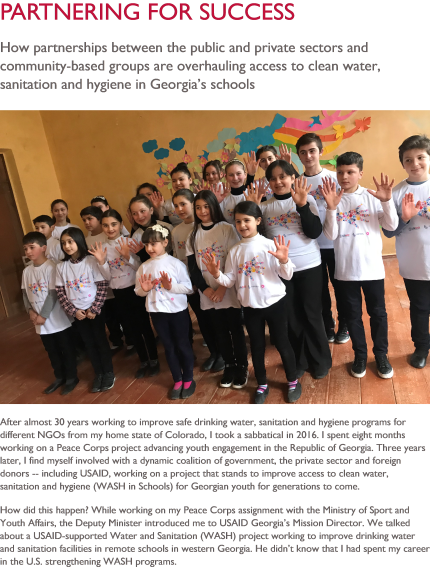Speeches Shim
How partnerships between the public and private sectors and community-based groups are overhauling access to clean water, sanitation and hygiene in Georgia’s schools
After almost 30 years working to improve safe drinking water, sanitation and hygiene programs for different NGOs from my home state of Colorado, I took a sabbatical in 2016. I spent eight months working on a Peace Corps project advancing youth engagement in the Republic of Georgia. Three years later, I find myself involved with a dynamic coalition of government, the private sector and foreign donors -- including USAID, working on a project that stands to improve access to clean water, sanitation and hygiene (WASH in Schools) for Georgian youth for generations to come.
How did this happen? While working on my Peace Corps assignment with the Ministry of Sport and Youth Affairs, the Deputy Minister introduced me to USAID Georgia’s Mission Director. We talked about a USAID-supported Water and Sanitation (WASH) project working to improve drinking water and sanitation facilities in remote schools in western Georgia. He didn’t know that I had spent my career in the U.S. strengthening WASH programs.
Immediately, Doug Ball -- USAID’s Mission Director at the time -- asked me to review the project. I traveled from urban Tbilisi to the rural mountains of Batumi, where I met Dr. Levan Metreveli from the Georgian Medical Group -- a man whose vision for better, healthier schools propelled the project forward. We visited a completed school, a nearly completed school and a school that was waiting for his love and attention.
The project was off to a good start, but many schools needed WASH support in rural Georgia. I agreed to help expand the project beyond the initial scope supported by USAID to ensure long-term sustainability and future growth.
From my WASH work over the years, I have found that forming a broad coalition of organizations from the public, private, non-governmental, and government sectors is key for creating sustained change. When organizations commit to building stronger communities, encouraging engaged students and citizens, and promoting local ownership over projects, it reduces the chances that communities and institutions will slip back into the conditions that led to poor health, poverty, and stagnation in the first place.
As development challenges grow increasingly complex, public-private partnerships are all the more valuable as each sector offers unique skills and resources to help create change. The private sector brings funds, project management and marketing expertise. NGOs have community contacts, local knowledge and cross-cultural skills. Governments have regulatory and legal authority and understand their communities’ needs and priorities. Organizations like Rotary have excellent reputations for their convening power and ability to get things accomplished. And donors like USAID have found that coalitions and partnerships can help leverage development contributions so they are stretched farther and accomplish more.
In Georgia, our initial coalition included the Georgian Medical Group, Rotary Club chapters in both Georgia and back home in the U.S., CARE and other organizations.
The WASH in Schools project in Georgia operates according to three pillars: Community Mobilization, Infrastructure Improvements, and Hygiene Education. The whole is greater than the sum of its parts and each pillar is vital to ensuring the project’s success, longevity and sustainability.
What does this look like?
Mobilizing school leadership, teachers, students, community leaders and parents to take ownership and responsibility for maintenance of infrastructure improvements protects these investments. Without this local buy-in, infrastructure improvements would likely slip back into the decayed state that the Georgia Medical Group and USAID found before the project started.
Infrastructure improvements amount to much more than building new bathrooms. The project also disinfects the water entering the school and properly treats the waste leaving the school. Also critical was installing hot water heaters. No hygiene education would be fully effective if students and staff must wash their hands with the freezing cold water common in the mountains of Georgia. Hot water encourages students to wash hands often and correctly.
Promoting better hygiene behaviors is the final piece of the puzzle. Volunteers train teachers and secondary students, who in turn teach students at the lower grades. Student leaders take great pride in joining the health club and knowing that students around the world tend to listen to their student leader peers, their messages help reinforce the importance of hand washing among younger students.
Forming our coalition and leveraging USAID Georgia’s funding has opened doors for even greater impact. Colgate-Palmolive, a private-sector partner for several years, has committed more in-kind support of cleansing and hygiene products as the project grows. The Coca-Cola Foundation, through its New World Fund, has provided two grants for further expansion. Other international and national NGOs have also asked to join. Rotary International, through the Rotary Foundation and clubs in the U.S. are adding funding and expertise to the project.
As the Government of Georgia prepares to ensure that all rural schools have proper drinking water, sanitation facilities, and hygiene education, I have no doubt this growing public-private partnership will be able to help.
- Steve Werner, a Colorado-based Water, Sanitation, and Hygiene expert, has spent 30 years building public-private partnerships to create enduring WASH programs in the United States. A member of Rotary International, he has recently lent his expertise to WASH programs in Georgia.


Comment
Make a general inquiry or suggest an improvement.